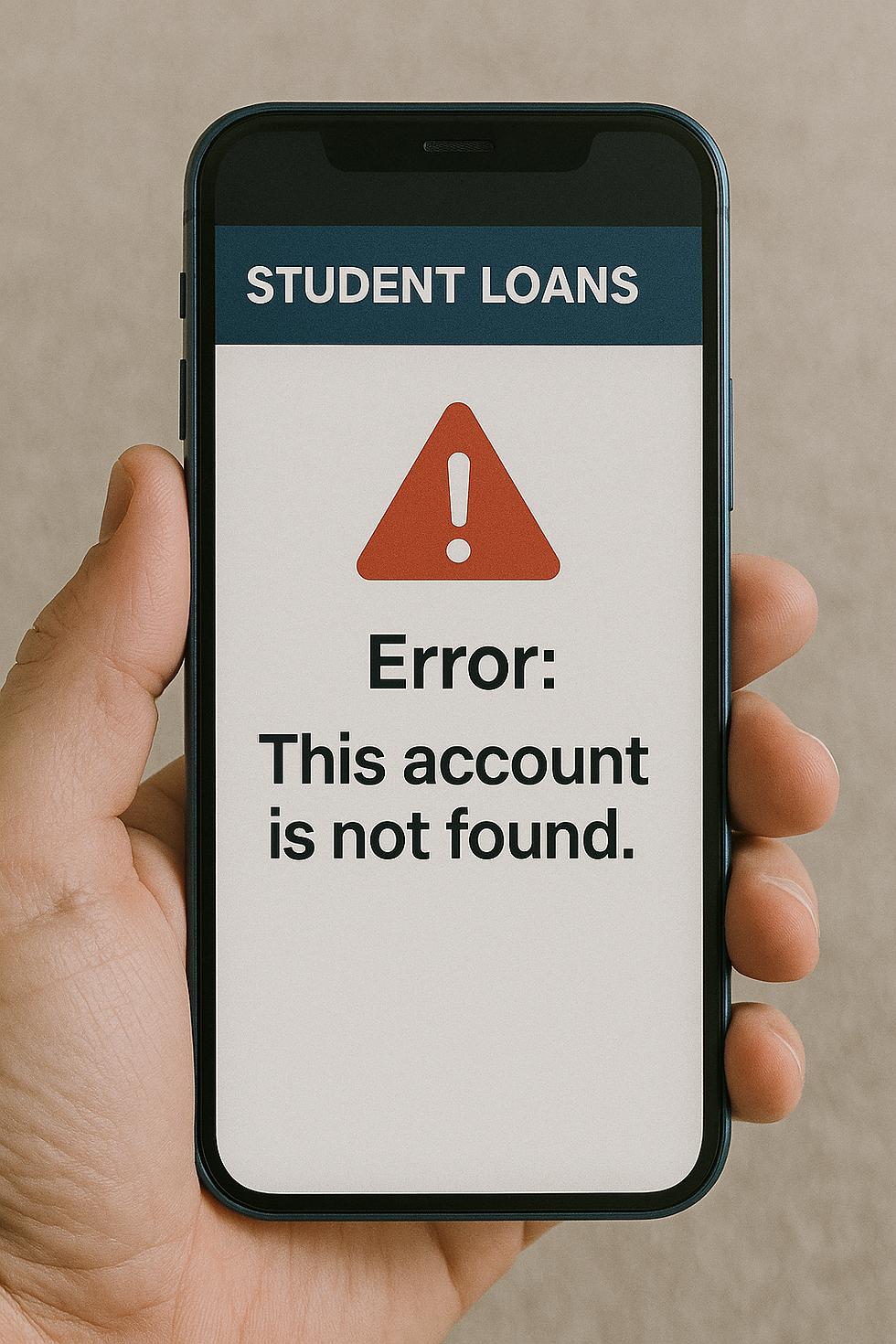Uncovering MOHELA's Systemic Failures: The 2023 DOE Press Release and 2024 SBPC Investigative Report
- jherrick26
- Jul 23
- 3 min read
Updated: 4 days ago
Student loan servicers like MOHELA are supposed to make repayment manageable, but public reports reveal a pattern of incompetence and neglect that's leaving borrowers in financial distress. Two pivotal documents—the U.S. Department of Education's (DOE) October 2023 press release and the Student Borrower Protection Center's (SBPC) February 2024 investigative report—expose MOHELA's widespread servicing breakdowns. These insights are especially relevant in light of recent lawsuits, like our client Athena's class action filed this month, which alleges similar violations of California borrower rights. Let's break down what these reports reveal and why they matter.

The 2023 DOE Press Release: Holding MOHELA Accountable for Billing Blunders
In a rare move, the Department of Education (DOE) announced on October 30, 2023, that it was withholding $7.2 million in payment to MOHELA for failing to meet basic contractual obligations during the return to student loan repayment. The press release detailed how MOHELA neglected to send timely billing statements to 2.5 million borrowers as payments resumed after the pandemic pause. As a result, over 830,000 borrowers became delinquent because they didn't receive their statements on time—some got them just seven days before payments were due, and around 2.5 million borrowers were placed in administrative forbearance with waived interest to prevent further harm.
Education Secretary Miguel Cardona emphasized accountability: "The actions we've taken send a strong message to all student loan servicers that we will not allow borrowers to suffer the consequences of gross servicing failures."npr.org. This was the first major enforcement action under a new accountability framework, signaling the DOE's intent to crack down on servicers amid the chaotic repayment restart.
These failures weren't isolated; they stemmed from under-resourcing and rushed system changes, as noted by industry groups. But for borrowers, the impact was immediate—delinquencies, credit hits, and unnecessary stress.
The 2024 SBPC Investigative Report: "The MOHELA Papers" Exposes Deep-Rooted Misconduct
Fast-forward to February 2024, when the SBPC, in collaboration with the American Federation of Teachers (AFT), released "The MOHELA Papers," a damning 47-page report based on a years-long investigation. Drawing from internal documents, borrower complaints, and public data, the report paints MOHELA as a "servicing giant" that's grown too fast—its portfolio tripled from 2.5 million to over 8.4 million borrowers between 2020 and 2023—without the capacity to handle it responsibly. Key findings include:
Widespread Servicing Failures: Over 40% of MOHELA's customers (more than 3.5 million borrowers) faced issues like incorrect loan information, delayed form processing, and a "call deflection" scheme that routed callers to dysfunctional website sections instead of live help. Average phone wait times hit two hours, with some reaching nine hours, and no weekend support.
Public Service Loan Forgiveness (PSLF) Program Mismanagement: As the exclusive PSLF servicer, MOHELA mishandled applications for public servants like teachers and nurses. Examples:
A backlog of over 800,000 unprocessed PSLF forms, forcing borrowers to make extra payments while waiting months for relief.
Incorrect payment counts in over 500 complaints in 2022, with 70% of reconsideration requests tied to errors.
Improper denials for nearly 5,000 eligible public service workers, including those from government agencies and universities, often over minor paperwork glitches.
Financial incentives for denials: MOHELA earns fees for both denying and later approving the same form ($8.17 extra per resubmission).
Payment and Billing Errors: MOHELA miscalculated bills for over 400,000 borrowers using outdated poverty guidelines for the SAVE plan, resulting in absurdly high payments (e.g., $10,000–$100,000 monthly). Other issues included lost payments, delayed refunds (e.g., a $2,000 unauthorized auto-debit taking a month to reverse), and misinformation about eligibility.
Deceptive Practices: Borrowers received false info, like being told they didn't qualify for PSLF despite eligible employment, or misleading advice on loan consolidation that delayed forgiveness.
The report calls for greater oversight, arguing MOHELA's practices harm borrowers' finances and undermine relief programs. It also notes MOHELA's role in blocking broader debt relief via the Supreme Court's Biden v. Nebraska decision.
Why These Reports Matter: A Call for Accountability and Action
Both the DOE press release and SBPC report underscore MOHELA's inability to fulfill basic duties, from timely billing to accurate processing—issues that have real consequences like damaged credit, unnecessary payments, and delayed forgiveness. These systemic problems align with complaints from California borrowers, as seen in our client Athena's July 2025 lawsuit, which cites MOHELA's online access denials, ignored IDR requests, and harassing collections.
If you're a California borrower who's experienced similar MOHELA mishaps—long waits, unprocessed forms, billing errors, or unfair collections—you may have rights under state law. Contact the attorneys at Clapp & Lauinger LLP for a free consultation: 760-209-6565 or jclapp@clapplegal.com, mlauinger@clapplegal.com, or jherrick@clapplegal.com.
Stay tuned to studentloancase.com for updates on ongoing cases and borrower resources. Share this post if it resonates, and let's push for a fairer student loan system.
Disclaimer: This post is for informational purposes only and not legal advice.


